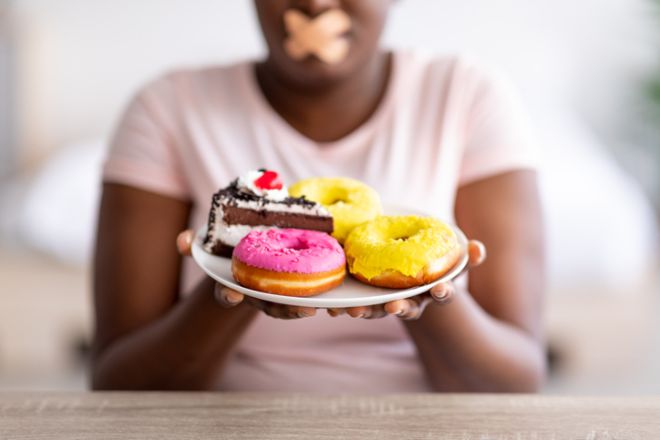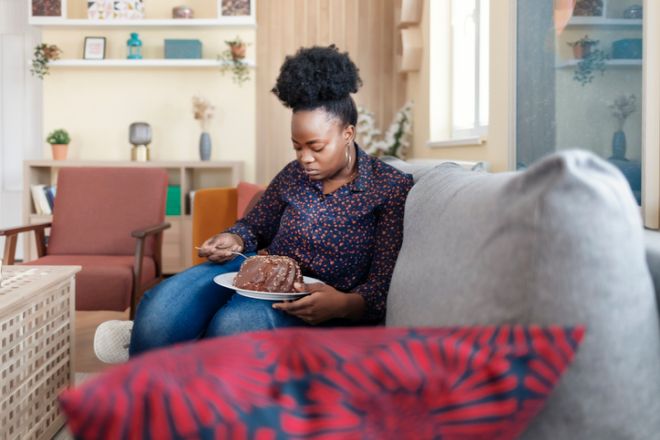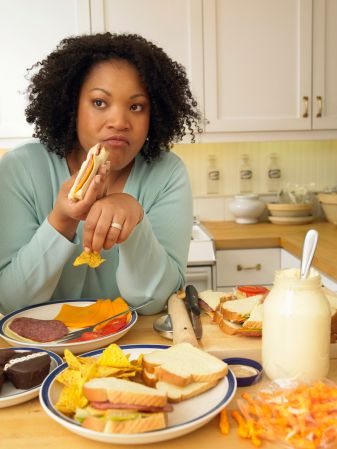4 Ways To Break The Habit Of Emotional Eating
Eat To Live, Not To Cope: 4 Steps To Quit Emotional Eating - Page 3
Share the post
Share this link via
Or copy link
We’ve all been there: you stick to your meal plan, hit every workout during the week, and feel totally in control. But then the weekend hits, and suddenly you’re elbow-deep in a bag of chips or reaching for your favorite cookies without thinking. The snacking seems endless, and the guilt follows right behind it.
Here’s the truth: it’s completely normal. You’re not weak or lacking willpower. This is a sign of emotional eating. But if you’re serious about losing weight, feeling better, and building a healthier relationship with food, recognizing emotional eating for what it is—and knowing how to stop it—is key.

1. What is emotional eating?

Related Stories
The first step to combating emotional eating is understanding the habit itself. According to Mayo Clinic, emotional eating is using food to cope with feelings, not hunger. It’s a way to soothe or suppress negative emotions like stress, sadness, anger, boredom, loneliness, or anxiety. These feelings can be triggered by major life events or, more often, by everyday stressors like relationship struggles, work pressure, fatigue, or burnout. It’s your brain’s way of trying to self-soothe. But unfortunately, those comfort foods don’t fix what’s really going on, and they can sabotage your health goals.
RELATED CONTENT: 10 Simple Ways To Eat Healthier In 2025
2. Understand that it’s not your fault.

Love MadameNoire? Get more! Join the MadameNoire Newsletter
We care about your data. See our privacy policy.
Psychologist Laurel Mellin, Ph.D., and author of 1-2-3 Joy!, says emotional eating is deeply wired into our stress response. In an interview with Woman’s World published on April 24, she explained that it’s not about self-control, it’s about brain chemistry.
“There are eight brain chemicals that get activated when we’re stressed and they drive us to eat,” explained Dr. Mellin. “Say you were ridiculed at school as a child, and when you came home, you found comfort in cinnamon rolls. Today, even a little bit of stress activates those same brain circuits, and you can’t help but reach for cinnamon rolls.”
So the first step? Stop blaming yourself. Be kind to yourself. Recognizing that emotional eating is a stress response—not a character flaw—is the foundation for lasting change.
3. Uncover your “hidden hungers.”

If you’ve ever thought, I just have no willpower, you’re not alone. But psychologist Melissa McCreery, Ph.D., author of The Emotional Eating Rescue Plan for Smart, Busy Women, says this mindset is part of the problem.
“It has nothing to do with self-control—it’s a response to a ‘hidden hunger,’” Dr. McCreery told Woman’s World in the same article.
When cravings hit, pause and ask yourself, What am I really feeling? Naming the emotion—whether it’s stress, loneliness, or boredom—can give you the power to choose a different path. Maybe you’re not actually hungry. Maybe you just need connection, comfort, or rest.
“Just saying, I’m stressed right now, helps you realize you may be craving something else, like a conversation with a good friend,” Dr. McCreery added. “This shift toward awareness lets you begin to take the power back from urges.”
4. Practice practical strategies to break the cycle.

While identifying emotional triggers is essential, here are a few practical steps that can help you manage emotional eating in the moment.
1. Fight Boredom with Purpose
If you’re not hungry but still feel like snacking, redirect your energy. Try taking a walk, watching a movie, playing with your pet, listening to music, reading a book, or calling a friend. Engaging your mind in a meaningful way can help reduce emotional cravings.
2. Out of Sight, Out of Mind
Keep comfort foods out of the house, especially when you know you’re feeling vulnerable. If you’re upset or feeling low, avoid grocery shopping until you feel emotionally grounded. It’s easier to make good choices when you’re not in the middle of a storm.
3. Don’t Deprive Yourself
Over-restriction can backfire. If your diet is too rigid or repetitive, you may end up craving emotional “relief” through food. Instead, eat satisfying portions of nourishing meals, allow for occasional treats, and include a variety of foods you genuinely enjoy. Feeling nourished reduces the pull of emotional cravings.
The cycle of emotional eating is deeply rooted in our brains and often in our past. Healing doesn’t come from punishment, it comes from self-awareness, patience, and kindness. By learning to recognize your emotional triggers and responding with compassion rather than criticism, you can finally begin to free yourself from the grip of emotional eating.
RELATED CONTENT: 10 Surprising Ways To Stop Emotional Eating
-

Meet Dominique Fils-Aimé, The Haitian-Canadian Star Redefining Jazz For A New Generation: ‘This is My Vision' [Exclusive]
-

Cooking With Purpose — How Brittney Williams Honors Her Caribbean Roots Through Food
-

Bucket Baddies With Big Energy — The 30 Hottest NBA Players In The Game Right Now
-

8 Famous Lesbian Women Who Were Married To Men




